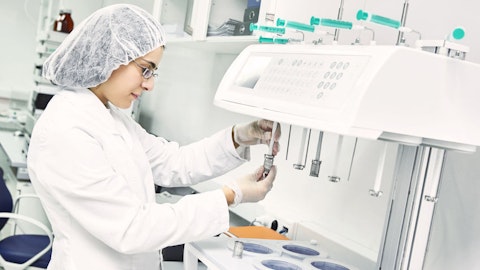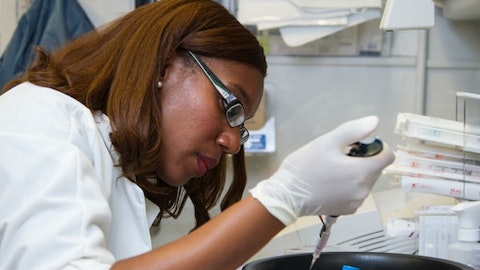Elizabeth Barrett: Great question. I’m going to ask Mark to answer the first one, and I’ll come back and answer the second question. Mark?
Mark Schoenberg: Yes, thanks. So we are advancing the Phase I monotherapy program for zalifrelimab, the anti-CTLA-4 antibody for intravascular treatment of high-grade disease. And as we’ve discussed previously, this is part of a master protocol that will permit us to study combinations with the antibody. We are already in the process of creating those components of the trial. So we would expect next year to be able to talk about our monotherapy experience and update you on how our combination work is going, particularly with our TLR7 agonist as well as potentially with other drugs of interest such as gemcitabine.
Elizabeth Barrett: Yes. And I think even from that standpoint to answer to the second question, but part of that as well is we also are looking at other products that are in the market that would like to combine with zalifrelimab and our technology. And so we are having active discussions with external companies. Nothing obviously to right now, but it is a priority for us to your second question. Sure. We would love to bring in something in this space. It’s a very active space, as you know, right now with large pharma but also in the biotech area. I think not likely in 2024 that we’ll be doing that. But as we get into 2025, absolutely. The one thing that’s really important about this business to note is this business is a highly leverageable business.
When we think about going in and being in uro-oncology, you can add multiple products to your portfolio and not have to add meaningfully to the infrastructure. So when you start to get down to 1, 2 years post-UGN-102, it’s a very significant improvement on our bottom line, which will give us the resources that we need to continue to build this company over the long haul. And the only other thing I’ll mean is we also are interested in taking UGN-102 to high-grade disease. We’re interested in taking UGN-102 to unwilling, unable, and the broader low-grade phase. So there’s a lot of things that will start to look at down the road. And I think one of the other things in — I’ll introduce Mike Louie is here with us. He’s our new Vice President of Medical Affairs and Clinical Development, who’s the lead on UGN-102 is also looking at a registry for UGN-102.
And just like we’re doing with JELMYTO. We’re seeing a lot of great data coming out of that registry that will start to publicize and you’ll see more publications in 2024 around that.
Operator: And our next question comes from Boris Peaker from TD Cowen.
Boris Peaker: Similar questions for me. First, from the FDA discussion you’ve had, did they specifically say why they wouldn’t accept ATLAS as a pivotal trial to support approval, just given the very strong hazard ratio and just efficacy out of it, that, that study has reported?
Elizabeth Barrett: Yes. Mark, do you want to answer or you want me to?
Mark Schoenberg: I’ll start out and Liz will undoubtedly comment. I think we were [indiscernible] really plan to enroll a larger number of patients in the ATLAS trial, substantially larger than we ultimately enrolled. The data are very strong but I think the fact that we halt enrollment would continue the trial with a smaller number of patients than originally anticipated in the original statistical analysis plan, probably inform some of the FDA’s position on the aggregate value of the ATLAS data as a stand-alone submission. But Liz may want to comment as well.
Elizabeth Barrett: No, I think that’s right. Look, we tried — the data is very compelling. Their initial stance on the data is exploratory. We made very clear that it is not exploratory data. It is significant data. They did come around to that way of thinking. But given that the — if you think about it from a prospective statistical analysis plan, we didn’t reach the end points that we would have needed to reach for that to be the pivotal study. So they just came back to — I will say, and Mark can say this as well, is there was a very positive study. It’s probably — the meeting with them. It was the most positive they have ever been. They were very impressed with the data. There was no pushback on the ENVISION only. We want to see durability, which, frankly, not only have they said that to us, they’ve said to everybody else in this space.
We want to see durability. You hear that every time you hear [indiscernible] in bladder cancer. So it was really more a matter of prospective, analysis plan and not being able to have that data in hand but again, very positive interaction. But they’ve been very clear all along, that they want to see durability and durability is as important to them at CR. But that was it. I mean we did try, Boris. I mean it was — obviously, we felt like compelling enough data, but we understood and we knew that it was a probability that they would say, you’ve got — we want to see the ENVISION durability date, which is exactly what they said. So we feel like we’re in a very, very strong position with them and knowing exactly what they want to see, when they want to see it, and we’re marching towards that.




